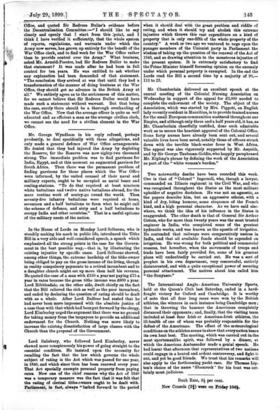Lord Salisbury, who followed Lord Kimberley, never showed more conspicuously
his power of going straight to the essential condition. He insisted upon the necessity for recalling the fact that the law which governs the whole subject of rating is the Act which was passed for one year, in 1840, and which since then has been renewed every year. That Act specially exempts personal property from paying rates. Now one of the chief reasons why the Act of 1840 was a temporary measure was the fact that it was felt that the rating of clerical tithe-owners ought to be dealt with. Parliament, in fact, always "looked forward to the period
when it should deal with the great problem and riddle of rating, and when it should try and abolish this extreme injustice which throws this vast expenditure on a kind of property that is only one-fifth of the whole property of the country." A week or two ago we ventured to urge upon the younger members of the Unionist party in Parliament the wisdom of taking up the question of the renewal of the Act of 184.0, and so drawing attention to the monstrous injustice of the present system. It is extremely satisfactory to find the Prime Minister himself focussing opinion on the anomaly under which personal property is exempted. In the end the Lords read the Bill a second time by a majority of 00,- 113 to 23.


































 Previous page
Previous page